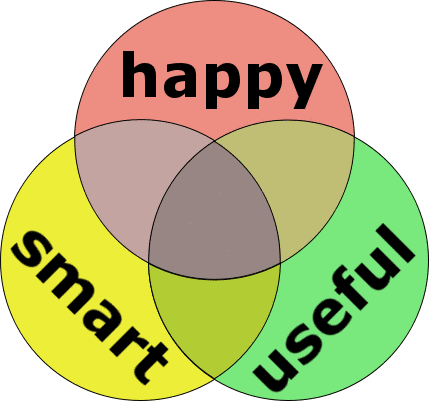Happy, Smart, and Useful
2016-03-03
There are three things to consider when making life-size decisions:
- What makes you happy
- What’s smart — meaning long-term good for you
- What’s useful to others
We have a tendency to forget one of these. For example:
Smart and useful (but not happy)
This is the stereotype of the strict parent who says, “You will go to the best school, get perfect grades, get a degree in law or medicine, and make lots of money. What you want does not matter. This is what’s best for you and your family.”
Smart and useful isn’t bad. It’s rational, like a machine. But happiness is the oil. Without it, the friction kills the engine.
Happy and smart (but not useful)
This is the stereotype of the “lifestyle design” or self-help addict: always learning, always improving, and obsessively focused on how to be happy and create the perfect life.
They look for “passive income” instead of focusing on doing something that’s really valuable to others.
Happy and smart isn’t bad. The self-focus feels great at first. But you can’t actually pull yourself up by your bootstraps. Ultimately you must be lifted by those around you.
Happy and useful (but not smart)
This is the stereotype of charity volunteers. After getting expensive university degrees, they spend years flying to exotic impoverished places to dig wells and thatch roofs.
But if a graduate’s time could be worth $200 per hour, yet they’re doing work that locals could do better for $10 per hour (and without airfare and hotels), then they’re actually doing a disservice to others. (For more thoughts on this, find two articles online: “Efficient Charity: Do Unto Others” and “The Reductive Seduction of Other People’s Problems.”)
In this same category are people who stay at the same jobs for life without improvement, and the musicians who always perform at the local venues but never make good recordings.
Happy and useful isn’t bad. These people are doing good for the world, so it’s hard to find fault. They have great intentions but lame strategies — wasted effort and unused potential.
Just happy (not smart or useful)
This is the parable of the Mexican fisherman.
Some say, “Just be happy. That’s all that matters.” It sounds so simple, it must be profoundly true, right?
But, as in Aesop’s fable of “The Ant and the Grasshopper,” you’ll be full of regret if you think of nothing but today and don’t prepare for tough times.
And you’ll be very unrewarded if you serve only yourself, not others.
So…?
When life or a plan feels ultimately unsatisfying, I find it’s because I’ve forgotten to find the intersection of all three:
- What makes me happy
- What’s smart
- What’s useful to others
